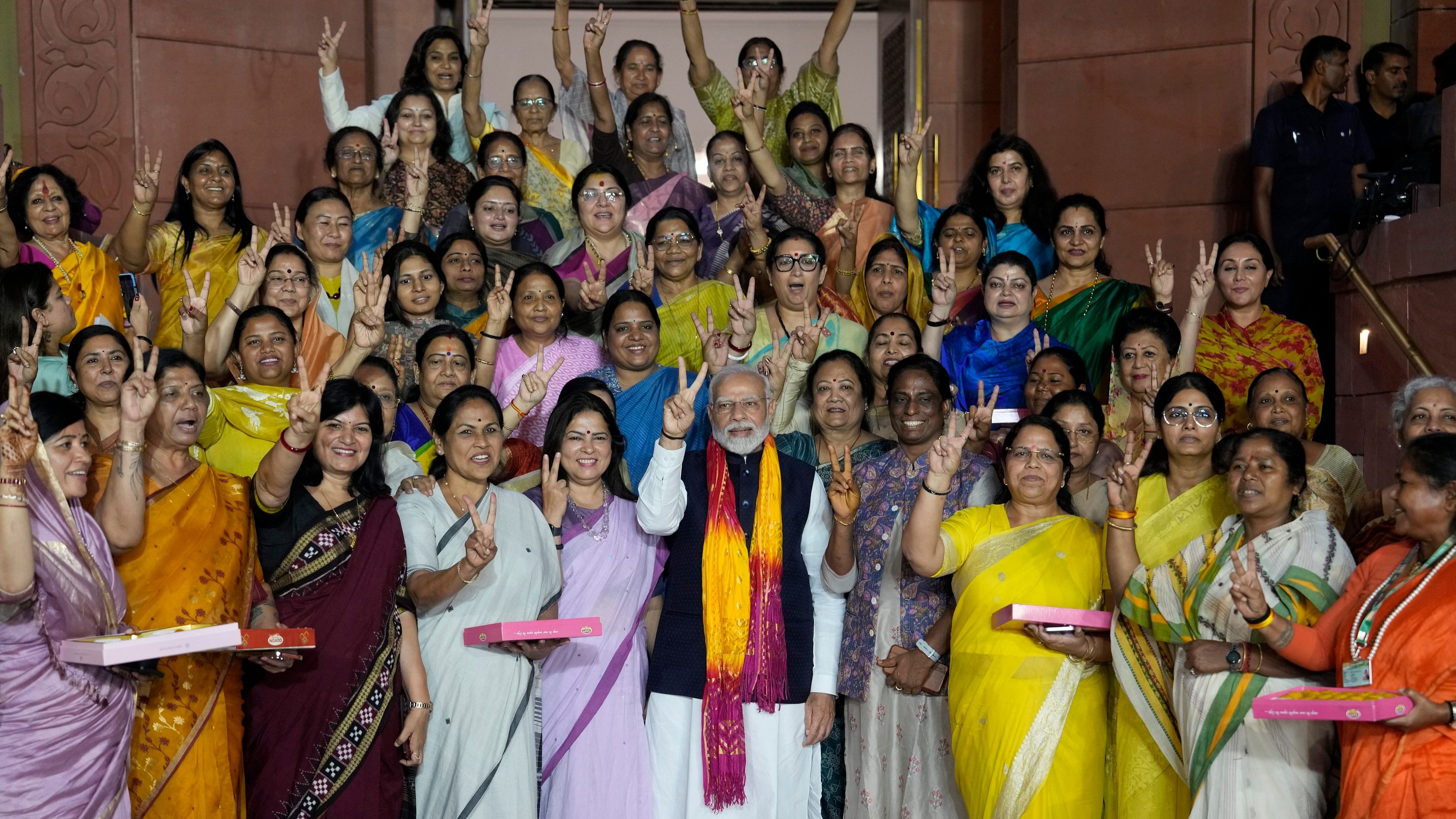
Women MPs celebrate with PM Modi after Women's Reservation Bill passes in Rajya Sabha.
Credit: PTI Photo
It is no small coincidence that Prime Minister Narendra Modi has chosen to trumpet his leadership of Parliament in the passage of the Women’s Reservation Bill (2023) by saying “God has chosen me” for the noble task of giving rights to women. The invocation of god (alas, not goddess) as the source of his authority should cause not just unease but outrage among all those women — feminists, women parliamentarians, advocacy groups — who have campaigned long and hard, over the past century, for a change in the composition of legislative bodies.
Modi’s choice of words is disquieting for many reasons; I will cite just two. It is ominous since an elected leader now openly invokes the divine right to rule. The Prime Minister’s choice of words also bodes ill for the new structure called Parliament, which will institutionally nurture the idea that ‘rights’ are bestowed on segments of the population as one man’s largesse, and are not a result of campaigns, discussion and debate, and of democratic processes.
Modi must, however, answer some important questions. Why has this ‘magnanimous’ gesture come at the end of a nine-year tenure, in a special session of Parliament, when the party in power had more than ample time to debate, discuss, and provide reasons for the now hastily produced Bill? As a party, has the Bharatiya Janata Party (BJP), like all other political parties without exception, fielded more women candidates over these 27 years since the 81st amendment was first introduced? Or even since 2010, when the Bill was passed in the Rajya Sabha? The short and resounding answer is no!
So here is the first important way of reading this ‘gift’ to women: until all political parties are placed equally under the ‘burden’ of fielding women in political contests, women will not find a voice in Parliament and state legislatures. Men enjoy the mandate of being the natural heirs — and fathers — of all political discourse. Exceptional women apart, political processes in India have not risked endangering or squandering the capital that male politicians have accumulated to field winnable women candidates. Nor have they thought fit to nurture women for careers in politics.
This is at an angle to the significant achievements of reservations for women in urban and rural local bodies. Innumerable studies since the 1990s have shown that contrary to the pervasive belief, women are not always proxies, not all proxies are inheritors, and quite a large number of women have learned the ropes of participating in urban local bodies the hard way.
This is also at a very significant angle to the demonstrable rise of male OBCs in legislatures and Parliament, since the 1980s, without reservations. Women clearly do not constitute a solid political block that can earn that kind of prestige and presence. After some initial hesitation, and much thoughtful debate and discussion, the women’s movement in India was open to the idea of OBC reservations within seats reserved for women (and it has already worked well in urban and rural bodies). Why then was this mysteriously dropped from the Bill in Parliament?
Even more troubling about the timing, and the commitment only to an indefinite future and not immediate implementation, is that gender has once more been used to trump caste. We have a long history of this. In 1931, women (following the Dalits at the time) unitedly made the demand for separate electorates, for the first time in Indian history unifying women of all communities in demanding equal political representation. That demand was quickly stifled by the insistence of Mohandas Karamchand Gandhi, among others, on national unity. This withdrawal would aid the passage of the Poona Pact of 1932, which substituted reservations for the separate electorates that were promised to B R Ambedkar. Women were asked to step back in their fight for equality in the name of benevolent nationalism.
So, just as the contentious question of the caste census is being discussed, and is being carried forward in some states, we have the masters in the arts of distraction taking us in a different direction, towards the place of women in a polity that is destined to change by 2031. As Nationalist Congress party (NCP) leader Supriya Sule has said, women have indeed been asked to wait in the wings with a post-dated cheque. The 2021 census has been skipped for mystifying reasons; perhaps we will move directly towards 2031. Meanwhile, the delimitation exercise is slated for 2026, which brings us back to 2031. Given the time needed for delimitation, we could be looking at 2035 or 2036 before the first women took their oath under the new law.
Let the Prime Minister, who is currently haemorrhaging over women’s rights, put his money where his mouth is and lead from the front. Let us move on to the 2024 elections with a large proportion of women candidates, and a party apparatus that will assure their win. Let us prepare the ground for their victory. That would be a truly great salute to the women of India. Until then, women must hold back cheers for this dubious honour.
(Janaki Nair is Professor (retd) of Modern Indian History, Centre for Historical Studies, Jawaharlal Nehru University, Delhi.)
Disclaimer: The views expressed above are the author's own. They do not necessarily reflect the views of DH.